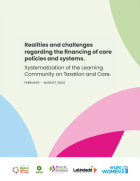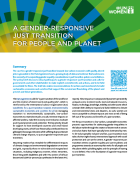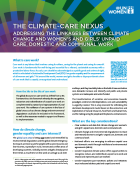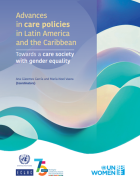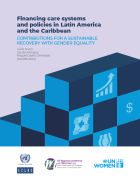1 - 14 of 14 Results
Date:
This document systematizes the learning community “Realities and Challenges on Financing Care Policies and Systems” held in 2024 by UN Women, Oxfam, GAC and other partners. Through six sessions, strategies, challenges and good practices around financing and fiscal sustainability were addressed, seeking a fair and equitable social organization of care.
Date:
The case for a gender-responsive just transition to low-carbon economies, aligned with the Paris Agreement, is supported by growing data on the need for gender equality in these policies. This brief outlines pathways for a just transition, urging governments and stakeholders to commit to concrete actions and accountability. It also provides recommendations for building sustainable economies that ensure the survival and flourishing of the planet for current and future generations.
Date:
Care work encompasses labor that involves caring for others, the planet, and oneself. It is essential for well-being and crucial to a sustainable economy with a productive workforce. Therefore, care should be recognized as a public good and a universal right, as outlined in Sustainable Development Goal (SDG) 5 on gender equality and the empowerment of women and girls. However, globally, women and girls bear an unequal share of unpaid, unrecognized, and undervalued care work.
Date:
El documento de trabajo “Política exterior feminista: Soluciones para un mejor mañana” recopila los principales insumos preliminares, propuestas y recomendaciones emanadas de las sesiones de la III Conferencia Ministerial sobre Política Exterior Feminista, que tuvo lugar en la Ciudad de México del 1 al 3 de julio de 2024. La III Conferencia generó un espacio de diálogo entre actores comprometidos con la ejecución de políticas exteriores con perspectiva de género y feminista para compartir buenas prácticas, lecciones aprendidas y desafíos comunes de implementación, y desde allí identificar soluciones innovadoras rumbo a las negociaciones del Pacto del Futuro que se acordará en el marco de la Cumbre del Futuro en septiembre 2024.
Date:
This document is a systematization of the series of dialogues "Towards people-centered Comprehensive Care Systems and Policies: Dialogues between Latin America, the Caribbean, and the European Union" which aims to serve as a guide to identify policies, regulations, initiatives and actions that put each of the priority populations at the center of comprehensive care systems: persons with disabilities, older persons, children and paid and unpaid care workers, with the objective of moving towards a care society.
Date:
The Women, Local Economy, and Territories (MELYT) program implemented by UN Women, the United Nations entity dedicated to promoting gender equality and women's empowerment and funded by the Italian Ministry of Foreign Affairs and International Cooperation (MAECI), through the Italian Agency for Development Cooperation (AICS), promotes the economic empowerment of rural women for the development of strong local economies, more equitable societies, and a better quality of life.
Date:
The UN Women Regional Office for the Americas and the Caribbean presents the regional report to analyze the progress of indicator 5.c.1 in the region. In 2021, 10 Latin American and Caribbean States, Bolivia, Brazil, Chile, Colombia, Dominican Republic, Ecuador, El Salvador, Guatemala, Panama, Paraguay and Panama, sent their responses to the voluntary questionnaire that measures progress towards indicator 5.c.1 of the SDGs. In this way, a more detailed view of the progress of indicator 5.c.1 in the region is sought, with the objective of promoting actions and policies that promote gender equality and the empowerment of women. It is important to note that the involvement and cooperation of the countries in the submission of data is fundamental to strengthen this type of report and generate a positive impact on the promotion of equality in the region.
Date:
The objective of this document is to compile good practices in gender budget initiatives by mapping the main advances in regulations, instruments, and tools developed in the countries of the LAC region and, based on these lessons learned, to draw up a road map that will serve as a reference framework to guide the development of new experiences and help consolidate existing ones.
Date:
The document begins by analysing international human rights instruments and references to care issues at the constitutional level in the countries of the region. National regulatory frameworks are then examined, along with laws on comprehensive care systems; maternity, paternity and parental leave; breastfeeding protection laws; and the regulation of care services. Data for the analysis are taken from the Gender Equality Observatory for Latin America and the Caribbean,1 a repository of laws and regulations on care. This repository provides official information from member States of the Economic Commission for Latin America and the Caribbean (ECLAC) and facilitates the monitoring of international agreements on women’s rights.
Date:
In Latin America and the Caribbean, care has gradually been placed at the centre of public agendas, albeit unevenly, as a result of growing political commitments, as well as the work of women’s movements and feminist economic studies. These contributions have focused on the need to reorganize and redistribute care work as a key factor in more egalitarian and inclusive societies. Over the course of more than four decades, the member States of ECLAC
Date:
This working paper provides a framework for women’s economic empowerment, which draws on lessons learned, key strategic documents, and expertise generated by the implementation of the MELYT Programme focusing on women, the local economy, and dynamic territories in the Trifinio area2 of Central America
Date:
This document substantiates the importance of care work for societies, defines the care sector’s current condition in Latin America and the Caribbean and describes the impacts caused by the COVID-19 crisis, as well as the contingency measures that have been implemented in various countries in the region to address the crisis. The document concludes with a series of policy recommendations to address the care crisis as a way out of the COVID-19 crisis.
Date:
The Policy Brief "Domestic Workers in Latin America and the Caribbean during the COVID-19 Crisis", prepared jointly by UN Women, ILO and ECLAC, illustrates the situation of special vulnerability faced by domestic workers in Latin America and the Caribbean, highlighting the impacts of the current crisis caused by COVID-19. It also describes the measures promoted by social actors and institutions in the countries of the region and makes visible how much can still be done to guarantee the labor rights of domestic workers.
Date:
In order to make progress in achieving significant equality in the country, it is necessary to analyze the conditions in which discrimination and gender gaps occur. Through this scenario, UN Women, in partnership with the Government of Colombia through the DANE, developed the flagship report "The Progress of women in Colombia 2018: transforming the economy to guarantee rights", a study that contributes to promoting accurate information that allows for the analysis and implementation of concrete actions so that the country fulfills its commitments to the Sustainable Development Agenda for the Year 2030.

